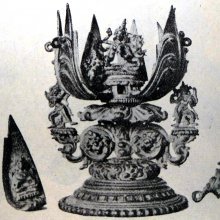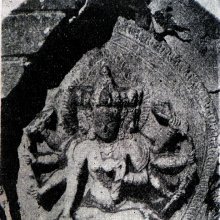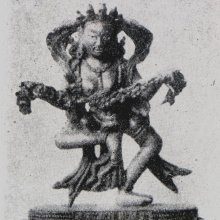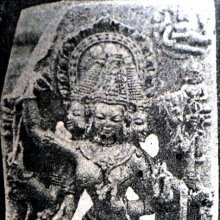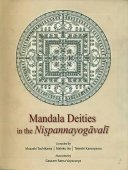Vajrataramandala, Vajratārāmaṇḍala, Vajratara-mandala: 1 definition
Introduction:
Vajrataramandala means something in Buddhism, Pali. If you want to know the exact meaning, history, etymology or English translation of this term then check out the descriptions on this page. Add your comment or reference to a book if you want to contribute to this summary article.
Images (photo gallery)
In Buddhism
Tibetan Buddhism (Vajrayana or tantric Buddhism)
Source: archive.org: The Indian Buddhist IconographyVajratārāmaṇḍala (वज्रतारामण्डल) refers to the Maṇḍala belonging to Vajratārā: one of the various emanations of Ratnasambhava, as mentioned in the 5th-century Sādhanamālā (a collection of sādhana texts that contain detailed instructions for rituals).
The Vajratārāmaṇḍala is described as follows:—
[In the four cardinal points there should be four goddesses on the four petals of the lotus on which Vajratārā sits:—1. Puṣpatārā (East), 2. Dhūpatārā (South), 3. Dīpatārā (West), 4. Gandhatārā (North).—All these (goddesses) should be situated in the inner circle.
The sādhana further says that the following Guardians of the Gates should also be meditated upon as around the principal goddess, but apparently not in the same circle with the four described above:—5. Vajrāṅkuśī (East), 6. Vajrapāśī (South), 7. Vajrasphoṭī (West), 8. Vajraghaṇṭā (North), 9. Uṣṇīṣavijayā (Above), 10. Sumbhā (Below).—All these goddesses stand on the orb of the sun in the Ālīḍha attitude with the right leg stretched forward. They are radiant like the Sun-god and are surrounded with a fiery halo. They are decked in ornaments of snakes.
These goddesses originate from the ten different letters of the mantra of Vajratārā, which is “Oṃ Tāre Tuttāre Ture Svāhā”, consisting of ten syllables. Each syllable brings forth a goddess, and these goddesses are said to be the embodiments of the ten Paramitas of the Mahāyāna School.]

Tibetan Buddhism includes schools such as Nyingma, Kadampa, Kagyu and Gelug. Their primary canon of literature is divided in two broad categories: The Kangyur, which consists of Buddha’s words, and the Tengyur, which includes commentaries from various sources. Esotericism and tantra techniques (vajrayāna) are collected indepently.
See also (Relevant definitions)
Partial matches: Vajratara, Mandala.
Full-text: Vajrasphota, Vajraghanta, Gandhatara, Shumbha, Dhupatara, Vajrankushi, Vajrapashi, Dipatara, Pushpatara, Vajrasphoti, Ushnishavijaya, Vajratara.
Relevant text
Search found 1 books and stories containing Vajrataramandala, Vajratārāmaṇḍala, Vajratara-mandala, Vajratārā-maṇḍala; (plurals include: Vajrataramandalas, Vajratārāmaṇḍalas, mandalas, maṇḍalas). You can also click to the full overview containing English textual excerpts. Below are direct links for the most relevant articles:
The Indian Buddhist Iconography (by Benoytosh Bhattachacharyya)
Related products
